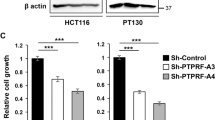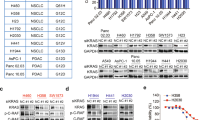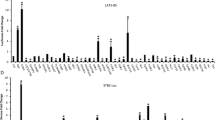Abstract
Although CD133 has been considered to be a molecular marker for cancer stem cells, its functional roles in tumorigenesis remain unclear. We here examined the molecular basis behind CD133-mediated signaling. Knockdown of CD133 resulted in the retardation of xenograft tumor growth of colon cancer-derived HT-29 and LoVo cells accompanied by hypophosphorylation of AKT, which diminished β-catenin/T-cell factor-mediated CD44 expression. As tyrosine residues of CD133 at positions 828 and 852 were phosphorylated in HT-29 and SW480 cells, we further addressed the significance of this phosphorylation in the tumorigenesis of SW480 cells expressing mutant CD133, with substitution of these tyrosine residues by glutamate (CD133-EE) or phenylalanine (CD133-FF). Forced expression of CD133-EE promoted much more aggressive xenograft tumor growth relative to wild-type CD133-expressing cells accompanied by hyperphosphorylation of AKT; however, CD133-FF expression had negligible effects on AKT phosphorylation and xenograft tumor formation. Intriguingly, the tyrosine phosphorylation status of CD133 was closely linked to the growth of SW480-derived spheroids. Using yeast two-hybrid screening, we finally identified receptor-type protein tyrosine phosphatase κ (PTPRK) as a binding partner of CD133. In vitro studies demonstrated that PTPRK associates with the carboxyl-terminal region of CD133 through its intracellular phosphatase domains and also catalyzes dephosphorylation of CD133 at tyrosine-828/tyrosine-852. Silencing of PTPRK elevated the tyrosine phosphorylation of CD133, whereas forced expression of PTPRK reduced its phosphorylation level markedly and abrogated CD133-mediated AKT phosphorylation. Endogenous CD133 expression was also closely associated with higher AKT phosphorylation in primary colon cancer cells, and ectopic expression of CD133 enhanced AKT phosphorylation. Furthermore, lower PTPRK expression significantly correlated with the poor prognosis of colon cancer patients with high expression of CD133. Thus, our present findings strongly indicate that the tyrosine phosphorylation of CD133, which is dephosphorylated by PTPRK, regulates AKT signaling and has a critical role in colon cancer progression.
This is a preview of subscription content, access via your institution
Access options
Subscribe to this journal
Receive 50 print issues and online access
$259.00 per year
only $5.18 per issue
Buy this article
- Purchase on Springer Link
- Instant access to full article PDF
Prices may be subject to local taxes which are calculated during checkout







Similar content being viewed by others
References
Siegel R, Ward E, Brawley O, Jemal A . Cancer statistics, 2011: the impact of eliminating socioeconomic and racial disparities on premature cancer deaths. CA Cancer J Clin 2011; 61: 212–236.
Cunningham D, Atkin W, Lenz H-J, Lynch HT, Minsky B, Nordlinger B et al. Colorectal cancer. Lancet 2010; 375: 1030–1047.
Reya T, Morrison SJ, Clarke MF, Weissman IL . Stem cells, cancer, and cancer stem cells. Nature 2001; 414: 105–111.
Dean M, Fojo T, Bates S . Tumour stem cells and drug resistance. Nat Rev Cancer 2005; 5: 275–284.
Pardal R, Clarke MF, Morrison SJ . Applying the principles of stem-cell biology to cancer. Nat Rev Cancer 2003; 3: 895–902.
Yin AH, Miraglia S, Zanjani ED, Almeida-Porada G, Ogawa M, Leary AG et al. AC133, a novel marker for human hematopoietic stem and progenitor cells. Blood 1997; 90: 5002–5012.
Miraglia S, Godfrey W, Yin AH, Atkins K, Warnke R, Holden JT et al. A novel five-transmembrane hematopoietic stem cell antigen: isolation, characterization, and molecular cloning. Blood 1997; 90: 5013–5021.
Mizrak D, Brittan M, Alison MR . CD133: molecule of the moment. J Pathol 2008; 214: 3–9.
Bussolati B, Bruno S, Grange C, Buttiglieri S, Deregibus MC, Cantino D et al. Isolation of renal progenitor cells from adult human kidney. Am J Pathol 2005; 166: 545–555.
Uchida N, Buck DW, He D, Reitsma MJ, Masek M, Phan TV et al. Direct isolation of human central nervous system stem cells. Proc Natl Acad Sci USA 2000; 97: 14720–14725.
Lee A, Kessler JD, Read TA, Kaiser C, Corbeil D, Huttner WB et al. Isolation of neural stem cells from the postnatal cerebellum. Nat Neurosci 2005; 8: 723–729.
Zhu L, Gibson P, Currle DS, Tong Y, Richardson RJ, Bayazitov IT et al. Prominin 1 marks intestinal stem cells that are susceptible to neoplastic transformation. Nature 2009; 457: 603–607.
Singh SK, Clarke ID, Hide T, Dirks PB . Cancer stem cells in nervous system tumors. Oncogene 2004; 23: 7267–7273.
Bao S, Wu Q, McLendon RE, Hao Y, Shi Q, Hjelmeland AB et al. Glioma stem cells promote radioresistance by preferential activation of the DNA damage response. Nature 2006; 444: 756–760.
O'Brien CA, Pollett A, Gallinger S, Dick JE . A human colon cancer cell capable of initiating tumour growth in immunodeficient mice. Nature 2007; 445: 106–110.
Ricci-Vitiani L, Lombardi DG, Pilozzi E, Biffoni M, Todaro M, Peschle C et al. Identification and expansion of human colon-cancer-initiating cells. Nature 2007; 445: 111–115.
Miki J, Furusato B, Li H, Gu Y, Takahashi H, Egawa S et al. Identification of putative stem cell markers, CD133 and CXCR4, in hTERT-immortalized primary nonmalignant and malignant tumor-derived human prostate epithelial cell lines and in prostate cancer specimens. Cancer Res 2007; 67: 3153–3161.
Todaro M, Alea MP, Di Stefano AB, Cammareri P, Vermeulen L, Iovino F et al. Colon cancer stem cells dictate tumor growth and resist cell death by production of interleukin-4. Cell Stem Cell 2007; 1: 389–402.
Vermeulen L, Todaro M, de Sousa Mello F, Sprick MR, Kemper K, Perez Alea M et al. Single-cell cloning of colon cancer stem cells reveals a multi-lineage differentiation capacity. Proc Natl Acad Sci USA 2008; 105: 13427–13432.
Kojima M, Ishii G, Atsumi N, Fujii S, Saito N, Ochiai A . Immunohistochemical detection of CD133 expression in colorectal cancer: a clinicopathological study. Cancer Sci 2008; 99: 1578–1583.
Horst D, Scheel SK, Liebmann S, Neumann J, Maatz S, Kirchner T et al. The cancer stem cell marker CD133 has high prognostic impact but unknown functional relevance for the metastasis of human colon cancer. J Pathol 2009; 219: 427–434.
Artells R, Moreno I, Diaz T, Martinez F, Gel B, Navarro A et al. Tumour CD133 mRNA expression and clinical outcome in surgically resected colorectal cancer patients. Eur J Cancer 2010; 46: 642–649.
Nikolova T, Wu M, Brumbarov K, Alt R, Opitz H, Boheler KR et al. WNT-conditioned media differentially affect the proliferation and differentiation of cord blood-derived CD133+ cells in vitro. Differ Res Biol Divers 2007; 75: 100–111.
Fan X, Matsui W, Khaki L, Stearns D, Chun J, Li YM et al. Notch pathway inhibition depletes stem-like cells and blocks engraftment in embryonal brain tumors. Cancer Res 2006; 66: 7445–7452.
Ma S, Lee TK, Zheng BJ, Chan KW, Guan XY . CD133+ HCC cancer stem cells confer chemoresistance by preferential expression of the Akt/PKB survival pathway. Oncogene 2008; 27: 1749–1758.
Boivin D, Labbe D, Fontaine N, Lamy S, Beaulieu E, Gingras D et al. The stem cell marker CD133 (prominin-1) is phosphorylated on cytoplasmic tyrosine-828 and tyrosine-852 by Src and Fyn tyrosine kinases. Biochemistry 2009; 48: 3998–4007.
Takenobu H, Shimozato O, Nakamura T, Ochiai H, Yamaguchi Y, Ohira M et al. CD133 suppresses neuroblastoma cell differentiation via signal pathway modification. Oncogene 2011; 30: 97–105.
Dubrovska A, Kim S, Salamone RJ, Walker JR, Maira SM, Garcia-Echeverria C et al. The role of PTEN/Akt/PI3K signaling in the maintenance and viability of prostate cancer stem-like cell populations. Proc Natl Acad Sci USA 2009; 106: 268–273.
Hu L, Zaloudek C, Mills GB, Gray J, Jaffe RB . In vivo and in vitro ovarian carcinoma growth inhibition by a phosphatidylinositol 3-kinase inhibitor (LY294002). Clin Cancer Res 2000; 6: 880–886.
Uddin S, Hussain AR, Siraj AK, Manogaran PS, Al-Jomah NA, Moorji A et al. Role of phosphatidylinositol 3'-kinase/AKT pathway in diffuse large B-cell lymphoma survival. Blood 2006; 108: 4178–4186.
Sarbassov DD, Guertin DA, Ali SM, Sabatini DM . Phosphorylation and regulation of Akt/PKB by the rictor–mTOR complex. Science 2005; 307: 1098–1101.
Stephens L, Anderson K, Stokoe D, Erdjument-Bromage H, Painter GF, Holmes AB et al. Protein kinase B kinases that mediate phosphatidylinositol 3,4,5-trisphosphate-dependent activation of protein kinase B. Science 1998; 279: 710–714.
Cantley LC, Neel BG . New insights into tumor suppression: PTEN suppresses tumor formation by restraining the phosphoinositide 3-kinase/AKT pathway. Proc Natl Acad Sci USA 1999; 96: 4240–4245.
Fang D, Hawke D, Zheng Y, Xia Y, Meisenhelder J, Nika H et al. Phosphorylation of beta-catenin by AKT promotes beta-catenin transcriptional activity. J Biol Chem 2007; 282: 11221–11229.
Wielenga VJ, Smits R, Korinek V, Smit L, Kielman M, Fodde R et al. Expression of CD44 in Apc and Tcf mutant mice implies regulation by the WNT pathway. Am J Pathol 1999; 154: 515–523.
Kraus S, Benard O, Naor Z, Seger R . c-Src is activated by the epidermal growth factor receptor in a pathway that mediates JNK and ERK activation by gonadotropin-releasing hormone in COS7 cells. J Biol Chem 2003; 278: 32618–32630.
Anders L, Mertins P, Lammich S, Murgia M, Hartmann D, Saftig P et al. Furin-, ADAM 10-, and gamma-secretase-mediated cleavage of a receptor tyrosine phosphatase and regulation of beta-catenin's transcriptional activity. Mol Cell Biol 2006; 26: 3917–3934.
Yang Y, Gil MC, Choi EY, Park SH, Pyun KH, Ha H . Molecular cloning and chromosomal localization of a human gene homologous to the murine R-PTP-kappa, a receptor-type protein tyrosine phosphatase. Gene 1997; 186: 77–82.
Jiang YP, Wang H, D'Eustachio P, Musacchio JM, Schlessinger J, Sap J . Cloning and characterization of R-PTP-kappa, a new member of the receptor protein tyrosine phosphatase family with a proteolytically cleaved cellular adhesion molecule-like extracellular region. Mol Cell Biol 1993; 13: 2942–2951.
Fuchs M, Muller T, Lerch MM, Ullrich A . Association of human protein-tyrosine phosphatase kappa with members of the armadillo family. J Biol Chem 1996; 271: 16712–16719.
Xu Y, Xia W, Baker D, Zhou J, Cha HC, Voorhees JJ et al. Receptor-type protein tyrosine phosphatase beta (RPTP-beta) directly dephosphorylates and regulates hepatocyte growth factor receptor (HGFR/Met) function. J Biol Chem 2011; 286: 15980–15988.
Arora D, Stopp S, Bohmer SA, Schons J, Godfrey R, Masson K et al. Protein-tyrosine phosphatase DEP-1 controls receptor tyrosine kinase FLT3 signaling. J Biol Chem 2011; 286: 10918–10929.
Flint AJ, Tiganis T, Barford D, Tonks NK . Development of ‘substrate-trapping’ mutants to identify physiological substrates of protein tyrosine phosphatases. Proc Natl Acad Sci USA 1997; 94: 1680–1685.
Chu P, Clanton DJ, Snipas TS, Lee J, Mitchell E, Nguyen ML et al. Characterization of a subpopulation of colon cancer cells with stem cell-like properties. Int J Cancer J Int Cancer 2009; 124: 1312–1321.
Wang J, Sakariassen PO, Tsinkalovsky O, Immervoll H, Boe SO, Svendsen A et al. CD133 negative glioma cells form tumors in nude rats and give rise to CD133 positive cells. Int J Cancer J Int Cancer 2008; 122: 761–768.
Shmelkov SV, Butler JM, Hooper AT, Hormigo A, Kushner J, Milde T et al. CD133 expression is not restricted to stem cells, and both CD133+ and CD133− metastatic colon cancer cells initiate tumors. J Clin Invest 2008; 118: 2111–2120.
Wei Y, Jiang Y, Zou F, Liu Y, Wang S, Xu N et al. Activation of PI3K/Akt pathway by CD133–p85 interaction promotes tumorigenic capacity of glioma stem cells. Proc Natl Acad Sci USA 2013; 110: 6829–6834.
Lombardo Y, Scopelliti A, Cammareri P, Todaro M, Iovino F, Ricci-Vitiani L et al. Bone morphogenetic protein 4 induces differentiation of colorectal cancer stem cells and increases their response to chemotherapy in mice. Gastroenterology 2011; 140: 297–309.
Ricci-Vitiani L, Mollinari C, di Martino S, Biffoni M, Pilozzi E, Pagliuca A et al. Thymosin beta4 targeting impairs tumorigenic activity of colon cancer stem cells. FASEB J 2010; 24: 4291–4301.
Talamonti MS, Roh MS, Curley SA, Gallick GE . Increase in activity and level of pp60c-src in progressive stages of human colorectal cancer. J Clin Invest 1993; 91: 53–60.
Aligayer H, Boyd DD, Heiss MM, Abdalla EK, Curley SA, Gallick GE . Activation of Src kinase in primary colorectal carcinoma: an indicator of poor clinical prognosis. Cancer 2002; 94: 344–351.
Chen YS, Wu MJ, Huang CY, Lin SC, Chuang TH, Yu CC et al. CD133/Src axis mediates tumor initiating property and epithelial-mesenchymal transition of head and neck cancer. PLoS ONE 2011; 6: e28053.
Bläker H, Mechtersheimer G, Sutter C, Hertkorn C, Kern MA, Rieker RJ et al. Recurrent deletions at 6q in early age of onset non-HNPCC- and non-FAP-associated intestinal carcinomas. Evidence for a novel cancer susceptibility locus at 6q14–q22. Genes Chromosomes Cancer 2008; 47: 159–164.
Starr TK, Allaei R, Silverstein KAT, Staggs RA, Sarver AL, Bergemann TL et al. A transposon-based genetic screen in mice identifies genes altered in colorectal cancer. Science 2009; 323: 1747–1750.
Novellino L, De Filippo A, Deho P, Perrone F, Pilotti S, Parmiani G et al. PTPRK negatively regulates transcriptional activity of wild type and mutated oncogenic beta-catenin and affects membrane distribution of beta-catenin/E-cadherin complexes in cancer cells. Cell Signal 2008; 20: 872–883.
Mak AB, Nixon AM, Kittanakom S, Stewart JM, Chen GI, Curak J et al. Regulation of CD133 by HDAC6 promotes beta-catenin signaling to suppress cancer cell differentiation. Cell Rep 2012; 2: 951–963.
Ochiai H, Takenobu H, Nakagawa A, Yamaguchi Y, Kimura M, Ohira M et al. Bmi1 is a MYCN target gene that regulates tumorigenesis through repression of KIF1Bbeta and TSLC1 in neuroblastoma. Oncogene 2010; 29: 2681–2690.
Kurata K, Yanagisawa R, Ohira M, Kitagawa M, Nakagawara A, Kamijo T . Stress via p53 pathway causes apoptosis by mitochondrial Noxa upregulation in doxorubicin-treated neuroblastoma cells. Oncogene 2007; 27: 741–754.
Komatsu S, Takenobu H, Ozaki T, Ando K, Koida N, Suenaga Y et al. Plk1 regulates liver tumor cell death by phosphorylation of TAp63. Oncogene 2009; 28: 3631–3641.
Kubo N, Wu D, Yoshihara Y, Sang M, Nakagawara A, Ozaki T . Co-chaperon DnaJC7/TPR2 enhances p53 stability and activity through blocking the complex formation between p53 and MDM2. Biochem Biophys Res Commun 2013; 430: 1034–1039.
Kondo J, Endo H, Okuyama H, Ishikawa O, Iishi H, Tsujii M et al. Retaining cell–cell contact enables preparation and culture of spheroids composed of pure primary cancer cells from colorectal cancer. Proc Natl Acad Sci USA 2011; 108: 6235–6240.
Acknowledgements
We thank Ms Kumiko Sakurai for technical assistance, Mr Daniel Mrozek (Medical English Service, Kyoto, Japan) for English editorial assistance and Dr Takafumi Nakamura (Graduate School of Medical Sciences, Tottori University Faculty of Medicine) for pHR lentiviral vectors. This work was supported in part by grants-in-aid from JSPS for Young Scientists (B) and for Scientific Research (C) (Grant numbers: 21790397 and 23591978, respectively), a grant-in-aid for Scientific Research (B) from JSPS (24390269) and a grant-in-aid from the National Cancer Center Research and Development Fund (25-B-3).
Author information
Authors and Affiliations
Corresponding author
Ethics declarations
Competing interests
The authors declare no conflict of interest.
Additional information
Supplementary Information accompanies this paper on the Oncogene website
Rights and permissions
About this article
Cite this article
Shimozato, O., Waraya, M., Nakashima, K. et al. Receptor-type protein tyrosine phosphatase κ directly dephosphorylates CD133 and regulates downstream AKT activation. Oncogene 34, 1949–1960 (2015). https://doi.org/10.1038/onc.2014.141
Received:
Revised:
Accepted:
Published:
Issue Date:
DOI: https://doi.org/10.1038/onc.2014.141
This article is cited by
-
Emerging roles of prominin-1 (CD133) in the dynamics of plasma membrane architecture and cell signaling pathways in health and disease
Cellular & Molecular Biology Letters (2024)
-
Functional Roles of CD133: More than Stemness Associated Factor Regulated by the Microenvironment
Stem Cell Reviews and Reports (2024)
-
Protein tyrosine phosphatases: promising targets in pancreatic ductal adenocarcinoma
Cellular and Molecular Life Sciences (2019)
-
Exosomes, metastases, and the miracle of cancer stem cell markers
Cancer and Metastasis Reviews (2019)
-
CXCL3 contributes to CD133+ CSCs maintenance and forms a positive feedback regulation loop with CD133 in HCC via Erk1/2 phosphorylation
Scientific Reports (2016)



